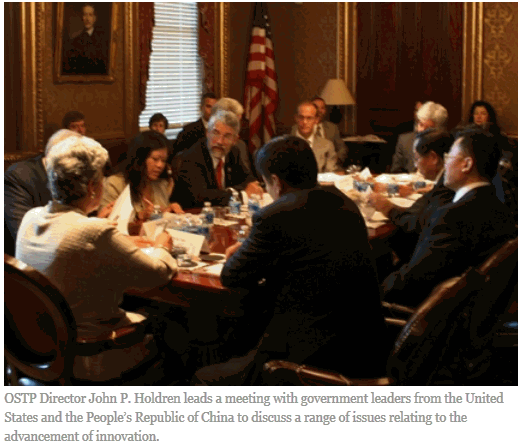
|
News & Views item - November 2011 |
![]() US Congress Spits the Dummy, Cuts OSTP's Budget by ⅓
. (November 16, 2011)
US Congress Spits the Dummy, Cuts OSTP's Budget by ⅓
. (November 16, 2011)
The Office of Science and Technology Policy (OSTP) is directed by the US president's science advisor, John Holdren, who is also co-chair with Professor Eric Lander of the President's Council of Advisors on Science and Technology (PCAST).
In May this year OSTP hosted meetings with Chinese officials contrary to a federal law enacted the month before.
Describing the matter the entry in Wikipedia notes: "Although not denying that the section in question of the Department of Defense appropriations bill had been broken the White House Office of Legal Counsel (OLC) instead asserted that this law did not "constitutionally apply to the OSTP's diplomatic activities." Justice Department has declared that the White House has the constitutional power to override a Congress statute forbidding members of the White House Office such as the OSTP from engaging in diplomatic activities with foreign officials."
In retribution for the snub the Republican dominated US House of Representatives this northern summer slashed 55% from OSTP's miniscule US$6.6 million budget while the Senate in which the Democrats hold a thin majority voted for a 9% cut. Yesterday the conference committee between the two houses settled on a 32% reduction of funding.
Just a week before the meeting Alan Leshner, CEO of the American Association for the Advancement of Science sent a letter to the congressional committee outlining the negative effect of a shrunken OSTP budget: "We believe such a drastic reduction to OSTP's budget will dramatically inhibit the ability of the federal government to coordinate, prioritize and manage the federal research and development (R&D) effort. This kind of reduction would also seriously limit the ability to take appropriate account of science and technology considerations in the formulation of diverse policies."
Jeffrey Mervis writing for ScienceInsider comments: "The cuts won't mean layoffs or furloughs for the office's 90-person staff, many on loan from other agencies or outside institutions. But it 'will have real consequences on OSTP's operations,' says OSTP spokesperson Rick Weiss, forcing OSTP 'to prioritize existing activities' in fields ranging from science education to sustainable energy."
Never mind, the OSTP has been disrespectful and disobedient and must be taught a lesson.
Mr Mervis concludes his report rather wryly:
[T]he 2012 spending bill retains the prohibitory language, although it gives the White House an opportunity to engage in some collaborations if it can "certify" that they "pose no risk … of transferring technology, data, or information with national security or economic security implications to China or a Chinese-owned company." It also requires that OSTP give Congress 14 days' notice and a full description of the proposed joint activity.